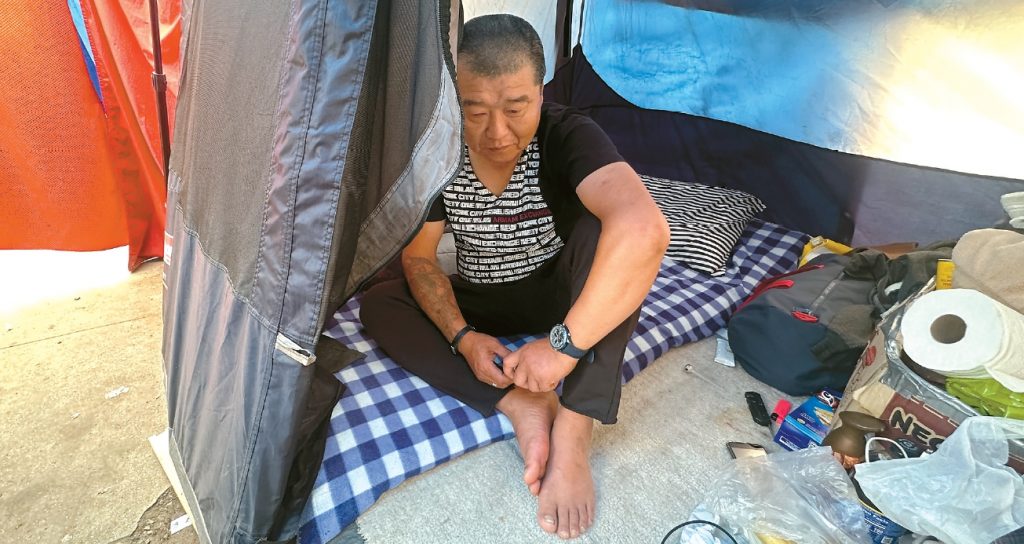[The Korea Daily-USC: Healing California Project]
Despite the growing number of homeless Korean Americans, some of whom have even died recently, it has been found that there is a lack of organizations and facilities available to protect them. Especially, existing organizations are struggling to operate because the government does not authorize them, and do not receive assistance.
In the past month, the Korea Daily has counted at least 55 Korean homeless people, including about 15 in two homeless encampments in Los Angeles Koreatown, 20 at Father Yohan Kim’s homeless shelter, and about 20 at Pastor Moody Ko’s Father’s Table Mission shelter and Victorville center.

This is a phenomenon that was unforeseen eight years ago when the emergence of homeless camps in Koreatown was first reported. Thirty-three homeless tents or tarps were counted in the neighborhood, but no Korean American homeless people were found at that time.
But as of May 2024, the situation has changed. Homeless Korean Americans have established themselves in at least two homeless encampments in Los Angeles Koreatown. Some of them without tents live with blankets or luggage in front of Korean markets, churches, and other businesses. Since the pandemic, Korean Americans whose economic and social foundations have collapsed are being pushed to the streets.
The majority of the Korean-American homeless individuals interviewed by the Korea Daily were not aware of the city’s homeless policy (Inside Safe LA), which provides temporary housing in motels and hotels. Many of them are either undocumented or do not speak English. Although the city of Los Angeles allocated $1.3 billion, or 10 percent of its total budget last year to address homelessness, these Korean-American individuals have not received any assistance, remaining in a “blind spot.”
The shelters that Korean Americans have created themselves to help homelessness are often operating on a border between legal and illegal. Some of them do not have the necessary licenses (Board and Care) to house homeless people. If a complaint is filed and the Fire Department or Department of Building and Safety inspects the shelters, they are subject to shut down, putting the Korean-American homeless people back to the streets.
In February 2014, the Los Angeles City Attorney’s Office filed civil charges against the operator of Agape Home Mission at the time, Pastor Kangwon Lee, for operating without a license and violating basic rights. Since 2000, Lee had provided housing for Korean-American homeless individuals and those struggling with drug and alcohol addiction. As a result of the charges, he was stripped of his license to operate the facility. Now, Lee himself is also homeless, living in a tent in Koreatown.
Korean-American homeless facilities often do not receive government funding because they are not officially registered. As a result, they rely on donations from the Korean-American community and the support of a handful of volunteers. To avoid crackdowns, these facilities also maintain a low profile. The shelter run by Father Yohan Kim, for example, has moved three times after receiving complaints from neighbors.
LA city officials prioritize principles and regulations over efforts to support Korean-American homeless shelters. “Korean-American organizations that run homeless shelters generally operate in poor conditions and often violate government regulations, which is why they cannot receive government support,” explained a Korean-American city government employee who requested anonymity.
“Even if I wanted to ask the mayor or city council for help, I don’t know how to approach them. There is no specialized staff,” said Pastor Moody Ko from Father’s Table Mission.
In response to inquiries about how to support Korean-American-run shelters, Los Angeles Mayor Karen Bass’ office said, “We are committed to overcoming this challenge by prioritizing the development of Korean-language resources and strengthening our collaboration with Korean-American organizations.”
Councilmember Heather Hutt’s office of District 10, which encompasses Koreatown, said, “If you need assistance with homelessness, you can contact a representative by phone at 213-473-7010 and by email at roger.estrada@lacity.org.”
According to “Invisibility as a structural determinant: Mortality outcomes of Asians and Pacific Islanders experiencing homelessness,” published by Santa Clara University Department of Public Health Professor Jamie Chang et al. in January 2023, Asians and Pacific Islanders (APIs) are “invisible and unacknowledged” in community public discourse and policymaking due to their minority status.
The report found that out of the 1,394 homeless deaths in Santa Clara County between 2011 and 2021, Asians and Pacific Islanders accounted for 87 deaths, or 6.2 percent. The leading causes of death for Asian American homeless individuals were injury and illness, which accounted for approximately 70% of the deaths, in contrast to the leading causes of death for other races, which were drugs and alcohol.
According to the internet publication Crosstown, a total of 2,374 homeless people died in Los Angeles County in 2022, more than double the 1,129 in 2018.
BY HYOUNGJAE KIM, HOONSIK WOO [kim.ian@koreadaily.com]




